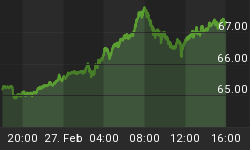Below is an excerpt from a commentary originally posted at www.speculative-investor.com on 26th June 2011.
Most people with a basic grounding in economics know that increasing the supply of money leads to a fall in the purchasing power of money. However, this is as far as most people's understanding goes and explains why monetary inflation is generally not unpopular unless the cost of living happens to be rising rapidly. Monetary inflation would be far more unpopular if its other effects were widely understood. We list, herewith, some of these other effects.
1. A greater wealth gap between rich and poor. For example, monetary inflation is probably a large part of the reason that the percentage of US national income captured by the richest 1% of Americans has risen from 9% to 25% since 1980. Inflation works this way because asset prices usually respond more quickly than the price of labour to increases in the money supply, and because the richer you are the better-positioned you will generally be to protect yourself from, or profit from, rising prices.
2. Large multi-year swings in the economy (a boom/bust cycle), with the net result over the entire cycle being sub-par economic progress due to the wealth that ends up being consumed during the boom phase.
3. Reduced competitiveness of industry within economies with relatively high inflation rates, due to the combination of rising material costs and distorted price signals. The distortion of price signals caused by the monetary inflation is very important because these signals tell the market what/how-much to produce and what to invest in, meaning that there will be a lot of misdirected investment and inefficient use of resources if the signals are misleading. In relation to this point it is appropriate to contrast the performances over the past decade of the manufacturing sector's of Germany and the US. Germany is far from being a bastion of economic freedom (its economy is hampered by a heavy regulatory burden) and German labour costs are high, and yet Germany's manufacturing sector has handily outperformed its US counterpart over the past decade. The only advantage that Germany appears to have had is the absence of an inflation-fueled boom. But what an advantage it turned out to be!
4. Higher unemployment (an eventual knock-on effect of the misdirection of investment mentioned above).
5. A decline in real wages over the course of the inflation-generated boom/bust cycle. Even during the boom phase of the cycle, wages will usually be near the end of the line when it comes to responding to the additional money. During the bust phase, the higher unemployment rate (the excess supply of labour) will exacerbate the tendency of wages to be slower to rise than most other prices in response to inflation.
Note that while a lower average real wage will partially offset the decline in industrial competitiveness resulting from distorted price signals, it won't result in a net competitive advantage. It should be intuitively obvious that an economy could never achieve a net competitive advantage from what amounts to counterfeiting on a grand scale.
6. More speculating and less saving. The greater the monetary inflation, the less sense it will make to save in the traditional way and the more sense it will make to speculate. This is problematic for two main reasons. First, saving is the foundation of long-term economic progress. Second, most people aren't adept at financial speculation.
7. Weaker balance sheets, because during the initial stages of monetary inflation -- the stages that occur before the cost of living and interest rates begin to surge -- people will usually be rewarded for using debt-based leverage.
8. Financial crises. Rampant mal-investment, speculation and debt accumulation are the ingredients of a financial crisis such as the one that occurred during 2007-2009.
The above is a sampling of what eventually happens when central bankers try to 'help' the economy by creating money out of nothing.
We aren't offering a free trial subscription at this time, but free samples of our work (excerpts from our regular commentaries) can be viewed at: http://www.speculative-investor.com/new/freesamples.html















